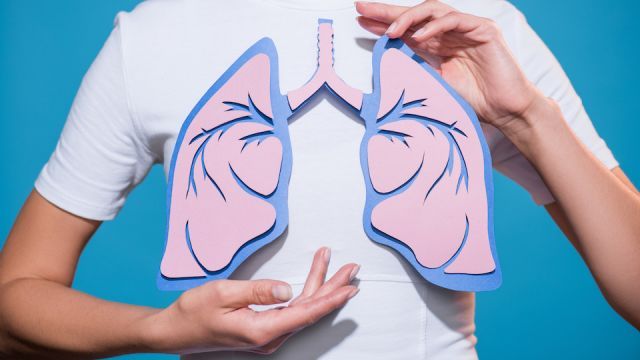
The lungs are susceptible to infection due to particle exposure, chemicals, and infectious viruses. In fact, it’s estimated that four million people die annually from respiratory tract infection and pneumonia alone. Additionally, in the US, one in every five people die from cigarette smoke. Lung clearing techniques may open airways, reduce inflammation, reduce the effects of smoke and pollution in the lungs, and improve lung capacity. Here’s how you can clear your lungs naturally.
A little prevention…
When we think of lung disease, it’s hard not to think about COVID-19. Experts say almost all of the serious consequences people face from coronavirus features pneumonia. And evidence suggests that pneumonia caused by coronavirus is particularly harsh. Currently, there is no cure, but efforts are underway to develop a vaccine. In the meantime, should you develop any lung disorders, you’ll need to do what you can to keep your lungs clear.
Steam inhalation
Research suggests that breathing in steam opens the airways and helps the lungs drain mucus. Cold or dry air can worsen lung conditions because the mucus membranes dry out, and blood flow is restricted. Steam adds warm moisture to the lungs and, when inhaled, can give you immediate relief with your breathing. Using steam therapy offers an effective temporary solution to improve respiratory function.
Try a cup of green tea
Green tea, due to polyphenols (compounds that boost the immune system), has anti-inflammatory properties that may help reduce inflammation in the lungs. In fact, a study published in The Journal of Nutrition looked at the link between green tea and chronic obstructive pulmonary disease (COPD). There are two main types of COPD: Chronic bronchitis, which creates a long-term cough and mucus, and emphysema, which damages the lungs over time. Both make it difficult to breathe. The study found that drinking two cups of green tea per day is associated with a reduced risk of COPD.
Supplement with turmeric
When breathing becomes difficult, and your chest feels heavy and congested, your air passages likely have excessive inflammation. Consuming turmeric can reduce inflammation and relieve symptoms. Numerous research has found that curcumin, the active compound in turmeric, is the reason turmeric has been found to have broad anti-inflammatory activities. Keep in mind though; you need more than a little sprinkle of turmeric on your food. Supplementing is the best alternative to reap the benefits.
Peppermint tea
Hot tea can soothe a scratchy throat, but peppermint tea goes one step further to help break up mucus and inflammation caused by pneumonia. Research published in Evidence-Based Complementary and Alternative Medicine found that certain herbs like peppermint provided a soothing effect on the throat, helped expel mucus, and eased the inflammation associated with pneumonia.
Teaspoon of honey
Research suggests that honey has antiviral and antibacterial properties. But a study published in JAMA Pediatrics looked at buckwheat honey versus dextromethorphan (DM) as a treatment for cough due to upper respiratory tract infection in children. The study found that a single dose of honey administered 30 minutes prior to bedtime provided symptomatic relief for cough and sleep difficulty in kids with infection. Interestingly, when comparing honey with DM, there was no significant difference.
Effective or controlled coughing
When lungs produce excess mucus, everyone coughs. But not all coughing is effective to loosen and expel mucus from the lungs. Sudden, explosive, or uncontrolled coughing can cause airways to collapse, and mucus to become trapped, suggests the Cleveland Clinic, further aggravating the lungs. Effective or controlled coughing is forceful enough to loosen mucus and carry it through the airways without causing them to collapse. Controlled coughing also helps retain energy and oxygen.
To control your coughing:
- Sit on a chair or the edge of your bed and place both feet flat on the floor. Lean forward slightly and relax.
- Folding your arms across your abdomen, begin to breathe in slowly through your nose.
- When exhaling, lean forward while pressing your arms against your abdomen.
- Cough sharply and quickly, two to three times through a slightly open mouth. The first cough should loosen the mucus in your chest and move it through your airways. The second and third cough allows the mucus to come up through the air passages and expel.
- After coughing, breathe slowly and gently through your nose (sniffing). This will help prevent mucus from flowing back down your airways.
- Rest and repeat again if needed.
Daily exercise
Thirty minutes of moderate exercise at least five days a week can greatly increase your capacity to breathe suggests the American Lung Association. While exercising with lung problems may be intimidating, exercising helps your lungs and heart stay stronger. Additionally, you’ll be able to perform daily tasks better.
Don’t take your breathing and respiratory health for granted
If you’re worried about the state of your lungs, there is some good news. Although the lungs are susceptible to infection, they are self-cleaning organs that will heal once exposure to pollutants are eliminated. Now is the time to make some lifestyle adjustments. By exercising, eating healthy foods and not smoking, you’ll help your lungs stay strong and better fight off infection.
Disclaimer: “None of this has been proven to prevent, treat or remedy COVID-19, these are just things to consider”
-Katherine Marko

